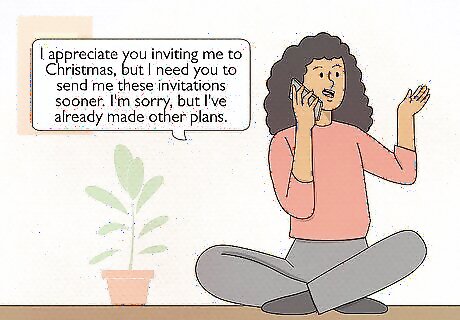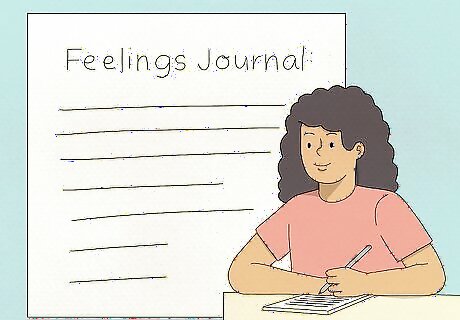
views
Coping with Your Emotions

Take time to understand your emotions. Notice how your body responds to the emotions that come up about your distant parent. It may help consult a professional counselor to discus your feelings and develop coping strategies for difficult emotions. If there’s another family member you can lean on, don’t hesitate to reach out. Try to keep up healthy regular routines, such as eating well, exercising, and sleeping, even when you feel sad or disappointed.

Don't blame yourself. It is not your fault that your parent is emotionally unavailable. Emotionally distant parents are dealing with their own issues and unable to provide their children emotional support. When you feel frustrated or guilty, remind yourself you're not to blame for your parents' distance. Instead of ignoring negative thoughts, replace them with positive ones. If you have a thought like "It's my fault my parent is acting this way," acknowledge that emotion. Then, replace it with something positive, like, "I'm trying my best with a difficult relationship and I deserve credit."

Recognize your beliefs are not reality. An emotionally unavailable parent can affect how you feel about yourself and the world. If you're struggling with negative emotions, remind yourself that there is a difference between belief and reality. Emotions are powerful, but they are not objective facts. Many people with emotionally distant parents feel they don't deserve love. If you feel this way, remind yourself that you believe this due to your relationship with your parents. It's not a reflection of reality. Imagine someone else is experiencing your feelings. If a loved one told you they didn't deserve love, you would likely reassure them that is not true. Give yourself the same level of support.

Create your own connections with others. If you can't get emotional support from your parents, seek it from others. A strained relationship with your parents can cause feelings of insecurity. To make yourself feel more secure and supported, work on building and maintaining your existing friendships. Seek out new friendships by joining a club, getting involved in a charity, or finding other ways to branch out and meet people. Remember, there are many different types of relationships that can be fulfilling. While it can sting to have a strained relationship with your parents, you likely have many other people in your life who love and support you.

Practice basic self care. It's hard to control your emotions if you're not doing basic things, like eating right and getting enough sleep. During times when your relationship with your parents feels particularly strained, make sure you're keeping up with the basics of self care. During rough patches with your parents, be extra aware of your daily schedule. Ask yourself whether you're eating enough, sleeping enough, and giving yourself enough down time. If you find you've been neglecting self care, make a conscious effort to take better care of yourself. Remember, you deserve to be cared for, even if your relationship with your parents makes you feel otherwise.
Managing the Current Relationship

Set boundaries. Boundaries are important to help you build a relationship with your parents that's manageable for you. Emotionally distant parents may play mind games or duck in and out of your life. Let your parents know what behaviors are not acceptable. Set boundaries in the moment when your parents do something that makes you feel uncomfortable. For example, if your parents invite you to a holiday event at the last minute, let them know you can't make it and that late invitations don't work for you. Say something like, "I appreciate you inviting me to Christmas, but I need you to send me these invitations sooner. I'm sorry, but I've already made other plans."

Recognize games and manipulation. Emotionally distant people are prone to manipulating others. Try to catch moments when your parents are being manipulative. If you catch your parents playing games with you, disengage immediately. Your parents may guilt you, make accusations, compare you to others, or engage in other behaviors to make you feel like their distance is your fault. Watch out for these kinds of behaviors. For example, say your parent suddenly starts calling you every day after ignoring you for months. When you're unable to take all their calls, they accuse you of not valuing the relationship. Refuse to respond to these accusations as they're a form of manipulation.

Stay present in your own life. It can be easy to get over-involved in drama caused by emotionally distant parents. If you find yourself exhausted by your parents, focus on what you have going on. Spend time with your friends, pursue your hobbies, and focus on your career and other relationships. Your parents do not have to define your happiness.

Do not ignore your emotions. While it's important to try to disengage from emotionally distant parents, remember it's okay to feel sad, frustrated, or angry. Do not always try to push away emotions. If your parents hurt your feelings, do something like vent to a friend, journal about how you're feeling, or take a long walk to help yourself process. While acknowledging emotions is important, you do not have to linger on them. Let yourself feel what you're feeling, but try to focus on other things after letting out your emotions.

Take steps to care less. You will never completely stop caring about your relationship with your parents. However, you can learn to gradually care less over time. Focus on building relationships with people who support you in return rather than seeking your parents' approval.
Overcoming the Effects of Emotionally Distant Parents

Recognize any issues you have from your childhood. Being aware of your issues can help you confront them head on. Spend some time examining yourself, your emotions, and your relationships with others. Take note of any issues that may stem from your parents. Many people with emotionally distant parents shut down or ignore their own feelings. Think about whether you're able to acknowledge and process your own feelings. You may have a sense of inadequacy or low self-esteem. If so, if this could be related to your relationship with your parents. You may feel empty and not sure why, or have a fear of rejection or being hurt.

Start with small steps. Repairing the damage of emotional neglect takes time, so start small. Take little steps to treat yourself with more compassion and love. For example, if you screw something up at work, stop if you start beating yourself up. Remind yourself you did your best and everyone makes mistakes. Do not be hard on yourself if it takes you awhile to care for yourself and trust others. The effects of an emotionally distant parent take a long time to undo. Small steps over time are key to healing.

Identify and meet your own needs. Many people with emotionally distant parents have trouble identifying their own needs and expressing what they want from others. When you're experiencing stress or negative emotions, take a step back. Think about what you need and how you can meet that need. For example, if you feel irritable after a long day, pause and acknowledge you need a break. It's okay to lie down and unwind if that's what you need.

Seek professional help. Therapy is key to undoing the effects of a difficult childhood. Look for a professional therapist who specializes in helping people with a history of family trauma or neglect. One on one sessions with a qualified professional can help you learn coping mechanisms to help you overcome the effects of emotionally distant parents. You can find a therapist by getting recommendations with friends, talking to your general practitioner, or looking online for therapists in your area.

















Comments
0 comment